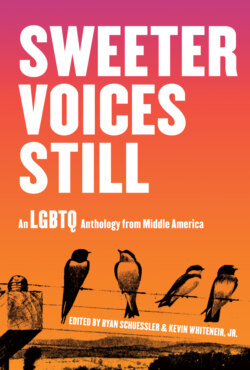Читать книгу Sweeter Voices Still - Группа авторов - Страница 8
На сайте Литреса книга снята с продажи.
ОглавлениеThe Midwest is a Two-Spirit Place
KAI MINOSH PYLE
OZAAWINDIB | THE HEADWATERS
Lake Itasca, MN
Me, standing there. Sunlight hot on my shoulders, water running ice-cold on my toes. I’m reaching for the bottom of the stream—and it is a stream, right here, not yet a grown river—where the rocks are smoothed down from time. Not as much time as you would think, though. The hidden dam has only been here for a hundred years, built by the programs meant to boost the country out of the Great Depression in order to make the headwaters “beautiful.” Something more momentous, something befitting the greatest of American rivers. Something that would draw in the tourists. They call it the Mississippi in English, but in the original languages of this place it never had only one name. Fiercely attendant to its twists and turns, the Dakota call it Ȟaȟáwakpa and Wakpá Tháƞka, the Anishinaabe call it Gichi-ziibi, Misi-ziibi, Wiinibiigoonzhish-ziibi, Bemijigamaag-ziibi, and finally at the point where it flows into the lake of deemed its origin, Omashkoozo-ziibi.
Two hundred years ago the woman named Ozaawindib would have known these names well enough to take those white men to the headwaters. In the journals that keep the accounts of the white men’s guided tour, they call her a brave man. Brave she surely was, but she was no man. Even the would-be American lover who scorned her thirty years earlier wrote in his book that all the Indians called her woman, no matter what kind of body she had been born with.
Those Americans called that white man the discoverer of the headwaters. They celebrated it as a scientific achievement. Ozaawindib, she knew his real goal, Mr. United States Indian Agent. Coming to insert himself into contentious Anishinaabe/Dakota relations—it was better for the U.S. if the Indians didn’t fight. Easier to make treaty, take their beautiful land.
Two hundred years later I am standing there, toes in the riverbed. A transgender Anishinaabe relative on stolen land. I am standing there and I am saying her name.
WAZOWSHUK | THE RESERVATION
Mayetta, KS
I found her in the pages of an old ethnography. Named three times over, I choose to remember her as Wazowshuk. That American name, the one they wrote in the census, is a deadname to me. To her wealthy employer’s daughter she was Louise, a name given in jest but received with joy. Fifty years after her death that employer’s daughter, a Potawatomi who married white, remembered her to an anthropologist, called her a queer fellow, gave her a girly nickname. A cute joke, but when the family came back from abroad she was wearing skirts. The grandmothers called her m’netokwe. Spirit woman. They still knew those old roles, those ceremonies for people like her. In 1970 anthropologists were still calling her berdache.
What I know is, “Louise liked she”—the closest thing I’ve ever seen to preferred pronouns recorded in the archive. I know she didn’t like to wear beadwork. She liked her employer’s daughter’s hand-me-downs, white women’s clothes, that stuff coming out in the Sears Catalogue. I know she like to ride sidesaddle in dresses through the Kansas fields. Even when those rich girls laughed.
Her father, born before the removal, wasn’t raised on those plains. He walked the Trail of Death to Osawatomie and made a new life on the reservation. It was just open prairie grass then, the land giving their tribe its new name. The 1880s came around and both his children got allotments, Wazoshuk male in the eyes of the government, but it was only a matter of time before that land was taken too. Not even a death date in the records to mark her passing. Nothing but a memory written down in these dusty pages.
RALPH KERWINEO | THE CITY
Milwaukee, WI
It was a scandal at the turn of the century: a woman passing as a man. A Black Indian passing as white. A jilted ex-wife. Interracial bigamy. The story had all the fixings, but it’s hard to find his voice recorded in newspapers that lied, put words in his mouth to suit their readers. Hard to even know to say she or he but I try anyway because s/he deserves better.
Cora was born in her ancestral homelands. Her mama had watched Potawatomi Territory become Indiana, married a Black man who’d come up from the south. It was safer with other brown folks, them and their in-laws the only dark faces for miles around. Cora got out of there as soon as possible: nursing school in Ohio, a job in Chicago, a new life in Milwaukee. It was a regular tour of the Midwest, those old Potawatomi lands. They looked different now though, all stone and smoke and street noises. Milwaukee was where he and his woman Mamie started calling him Ralph. Life’s a tough business for a pair of brown girls, they said.
It worked just fine for a while—until he ditched Mamie for a white girl. Well, you can bet that she went straight to the police, ratted him out, and that was all the press needed. Newspapermen at the doors of his jail cell hounded him. There was a court case, tears and brash defenses, a recalcitrant repentance. When he got out he toured the freakshows for a while. Man-woman they called him.
It’s hard to say what happened after that. A few years later they found him again in Menasha undressed in bed with a pretty girl, men’s trousers rumpled on the floor. They charged him with vagrancy, too. What I want to know is this: how can you be a vagrant in your own homeland?
